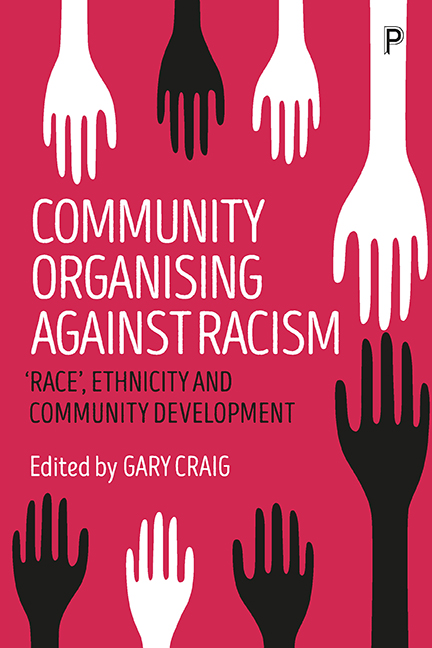Book contents
- Frontmatter
- Dedication
- Contents
- List of figures
- Author biographies
- List of abbreviations
- Introduction
- Section One Community development with ethnic minorities: history, theory, policy
- Section Two Building capacity with BME groups
- Section Three Working with Roma communities
- Section Four Global experience
- Section Five Working across cultural boundaries: ideological and personal reflections
- Afterword: Messages for community development in working with minority groups
- Index
Section Four - Global experience
Published online by Cambridge University Press: 12 April 2022
- Frontmatter
- Dedication
- Contents
- List of figures
- Author biographies
- List of abbreviations
- Introduction
- Section One Community development with ethnic minorities: history, theory, policy
- Section Two Building capacity with BME groups
- Section Three Working with Roma communities
- Section Four Global experience
- Section Five Working across cultural boundaries: ideological and personal reflections
- Afterword: Messages for community development in working with minority groups
- Index
Summary
This section contains six accounts drawn from different corners of the world – Romania, the US, Canada, Australia and Hong Kong (with a seventh, New Zealand, appearing in Section Five) – of community development with BME groups: these include such disparate groups as young Roma, First Nations peoples, those seeking asylum and migrant workers. The contexts for this work include empowering work, building leadership, using arts and culture as a means of building confidence, addressing racism and discrimination and promoting integration. This selection of accounts is not, of course, presented as being representative of all such work across the world: the intention of including this section was merely to demonstrate that the challenges facing community development workers addressing issues of racism across the world were similar, despite the differences in local history, culture, social, economic and political context and the varying forms of approach used. These accounts are a selection from a wider range of those offered following an international call for contributions made by the editor as the book was gestating. The selection here was made on the basis that the contributions provided a good range of accounts in different policy contexts and from significantly differing parts of the world but offered the possibility of contrasting and complementary experience vis-a-vis the accounts from the UK. The only more unique contributions here in terms of context are those that deal with the experience of working with First Nations people in Australia and New Zealand/Aotearoa.
In Chapter Twelve Cocris reports on work with Hungarian youth in Romania, a country emerging from a political and welfare regime that was highly structured, autocratic and hierarchical, contrasting almost entirely with the kinds of values reflected in community development work. Here the focus is on a white ethnic minority dominated by a white majority. The Hungarian minority, a product of the country's turbulent history and changing borders, has long been regarded with suspicion and hostility by native Romanians. The existence of a YouthBank, a grant-giving mechanism that itself was autonomous, provided both community groups and groups of young people with the autonomy to develop intercultural projects in an atmosphere of acceptance rather than ‘invitation’ where the minority felt beholden to the majority.
- Type
- Chapter
- Information
- Community Organising against Racism'Race', Ethnicity and Community Development, pp. 199 - 202Publisher: Bristol University PressPrint publication year: 2017



